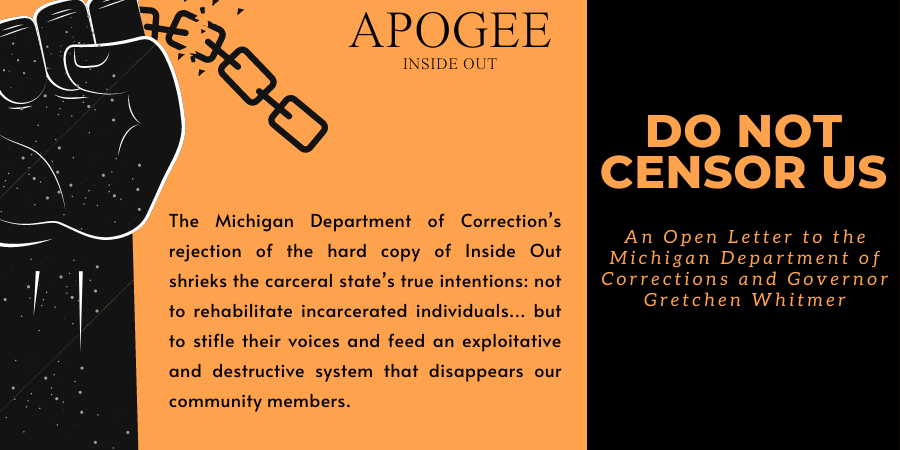Do Not Censor Us: An Open Letter to the Michigan Department of Corrections and Governor Gretchen Whitmer
In March of 2022, Apogee editors received notice that our issue featuring work by incarcerated writers, Inside Out,was rejected by the Michigan Department of Corrections because it “promotes violence.” Because of this rejection, one of our contributors, Demetrius “Meech” A. Buckley, a talented and accomplished essayist, poet, and fiction writer, could not receive a copy of the journal. For the first time, we were unable to share an issue with one of the contributors featured in it.
Inside Out is a fusion of creative work from a variety of forms, including poetry, fiction, memoir, and visual art; the contributors share common ground: all of them are incarcerated or formerly incarcerated. Apogee Journal, a New York-based literary magazine that publishes the work of underrepresented artists and writers, created the issue in partnership with Empowerment Avenue, a collective committed to the radical act of fairly paying incarcerated writers and artists for their work. Inside Out provides a window for non-incarcerated readers to understand the nuances of the oppressive prison system from the perspectives of imprisoned people—nuances rarely (if ever) presented by mainstream news sources. In addition to showcasing accounts of conditions suffered by incarcerated people during the outbreak of the Covid-19 pandemic—incarcerated people are infected by the coronavirus at a rate higher than five times the national average—the issue also serves as a space for incarcerated individuals to gain traction in an otherwise exclusive creative community, offering them the opportunity to promote their craft and contribute their work to wider audiences while being monetarily compensated.
The Michigan Department of Correction’s rejection of the hard copy of Inside Out shrieks the carceral state’s true intentions: not to rehabilitate incarcerated individuals for reintegration into society, but to stifle their voices and feed an exploitative and destructive system that disappears our community members.
This censorship is not an isolated incident for Michigan’s correctional system. In 2019, the Human Rights Defense Center (HRDC), an organization that supplies incarcerated individuals vital knowledge on prison conditions, legal rights, and information on remaining physically and mentally secure while detained, filed a lawsuit against the Michigan Department of Corrections (MDOC) because of the department’s censorship of two crucial resources within HRDC: Prison Legal News and Criminal Legal News. MDOC also censored books mailed to prisoners from HRDC, giving the center no advance notice and failing to provide a process by which to challenge censorship decisions. The Michigan Department of Corrections claimed that the resources provided by the Human Rights Defense Center were a “threat to the security, good order, or discipline of the facility.” The Human Rights Defense Center argued that their resources did not threaten legitimate correctional interests and that censorship violates the First Amendment, which grants publishers the right to communicate with prisoners, and due process laws.
Prison facilities have historically used ambiguous accusations to justify censorship, accusations that vary from facility to facility and even from guard to guard. Many facilities don’t keep a record of the books that have been censored. Some particularly shocking examples include: an Ohio prison’s rejection of a biology textbook from a book donation group on the basis that the anatomical drawings were sexually explicit; a Wisconsin review committee’s ban of publications about the Black Panthers but its allowance of Mein Kampf; and the Texas Department of Corrections’ allowance of two books by neo-Nazi David Duke and rejection of The Color Purple.
In writer Demetrius A. “Meech” Buckley’s story “Juxtaposition,” featured in Inside Out, the narrator admires Sensei, a man in solitary confinement who receives forty-five minutes of “outside time” (in a cage) a day. Readers learn about Sensei’s past during a shared workout in the yard. The narrator admires Sensei’s will to survive in this environment. Buckley writes in chilling detail: “Sensei stayed strong for so long where men break like the icicles hanging from gutters, to the point of crashing suicide. The hole is built for suicide. The loop, the mind; the rope, sleep.” Buckley’s piece transports non-incarcerated readers to a situation they’ve likely never experienced before, capturing the inhumanity of solitary confinement in a personal and intimate manner that statistics alone can never achieve.
In reference to the rejection of a hard copy issue of Inside Out, the Michigan Department of Justice claimed that our project “promotes violence,” likely in reference to Buckley’s piece, which alludes to Sensei killing a guard. However, to say that the piece promotes violence makes numerous false assumptions: 1) That the piece explicitly supports violence. In fact, Sensei tells the narrator, “Nobody deserves to die–don’t ever say that. Sometimes to not fight…is to fight.” 2) That representations of violence in literature and art should be silenced, an assumption clearly challenged by many books that are allowed inside prisons.
The Michigan Department of Corrections’ rejection of Inside Out is especially discouraging when considered with other incidents of carceral censorship that have recently occurred, namely, the New York State Department of Corrections and Community Supervision’s enactment of the Secure Vendor Program in June of 2022. Many incarcerated individuals rely on food deliveries from non-incarcerated family and friends to have access to fresh food, something largely inaccessible in prison. This package ban, however, prohibits all care packages containing food; non-incarcerated relatives and friends will only be allowed to send two non-food packages per year to their incarcerated loved ones, and they must be sent through the US Postal Service, FedEx, or UPS. Any other packages must be purchased by local vendors. The department has reasoned that this ban will supposedly limit drugs and other contraband from getting into prisons via relatives; however in reality, much of the drug contraband that gets into prisons comes in through prison staff. In fact, drug overdoses spiked in New York state prisons during the height of the Covid-19 pandemic even though visitation and deliveries were severely restricted to prevent outbreaks. This package ban instead eliminates access to fresh food in prison and monetizes prisoners’ interactions with loved ones, benefitting private vendors and mailing companies, and making communication with external society especially difficult for low-income incarcerated individuals.
Our work on Inside Out revealed the importance of interaction between incarcerated individuals and their loved ones, something that is severely constrained by package bans such as the one in New York. For example, in writer Traci Jackson’s “Happy Valentine To Me,” Jackson pleads for intimacy and connection for those who “don’t have the privilege of being with the ones they love.” April Harris contextualizes the challenge of being a mother in prison in “How Long has it Been?”: “It has been twenty four years since I’ve heard the sound of my kids’ chatter. / It has been twenty four years of them thinking that they do not matter.” When Chana L. Woods writes “Still you’re my child… life… my / First love,” we witness the pain of this separation. These writers remind us of the reverberations of incarceration—entire families and communities scarred by the absence of partners, parents, and children. Getting packages from loved ones can be vital to those who are in prison, both physically and mentally.
As a literary magazine that was founded with the express purpose of uplifting marginalized voices, Apogee Journal views censorship, namely the rejection of the hard copy of Inside Out by the Michigan Department of Justice, as a gross violation of the rights of incarcerated individuals. It has also been proven that language, literacy, and reading—and thus, providing incarcerated individuals with various forms of literature—reduces recidivism. Not only is it an imperative to increase literary accessibility for incarcerated individuals, it is also necessary for us to recognize the essential right to knowledge and communication. In his poem “Don’t Judge Me” from Inside Out, Kunlyna Tauch writes of searching for “A reason to survive. / A reason to appreciate life. / A reason to cry out so I won’t be reduced to embers / & die out.” When the state censors literature and art in prisons, it denies crucial reasons to continue living from those who need them most.
Lakshmi Sunder
On behalf of Apogee editors
If you would like to co-sign this letter, please fill out the form here.


